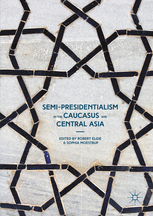Sophia Moestrup and I have edited a new volume called Semi-Presidentialism in the Caucasus and Central Asia. It is published by Palgrave Macmillan.
The book contains two chapters by Sophia and I. In the Introductory chapter we describe constitutional variation across the region and outline the basic research questions of the book: do institutions matter in post-Soviet countries? If so, do they matter for democratic performance? Whatever the answer, has the organization of the executive and executive-legislative relations had an impact on political life? In the Concluding chapter, ‘Weaker Presidents, Better Semi-Presidentialism’, we present a single policy recommendation: countries should adopt a constitution with a relatively weak presidency. All else equal, weak presidential institutions are likely to be more beneficial than super-presidencies. We argue that these benefits derive both from the intrinsic institutional incentives associated with such a system as well as the creation of environment in which the choice of a weak presidency is seen as being an attractive constitutional choice.
The book also contains a scene-setting chapter by Alex Baturo. This chapter provides an overview of similarities and differences between the political regimes that emerged in post-Soviet Eurasia, showing how “patronal” first secretaries under the Soviet Union became “patronal” presidents of their own nation-states after independence.
There are also four country case study chapters on semi-presidentiaism in Armenia, Azerbaijan, Georgia, and Kyrgyzstan, as a well as a fifth case study of presidential Kazakhstan. These chapters look at the reasons for institutional choice in these countries, including Kazakhstan’s brief flirtation with semi-presidentialism in the early 1990s, as well as an assessment of the constitutional powers of the presidents in all of these countries, and an analysis of the reality of vertical power and political pluralism (or its absence) in practice.
More details can be found at the Palgrave website. Indeed, there are more details still, including chapter abstracts, from the Springer website.
